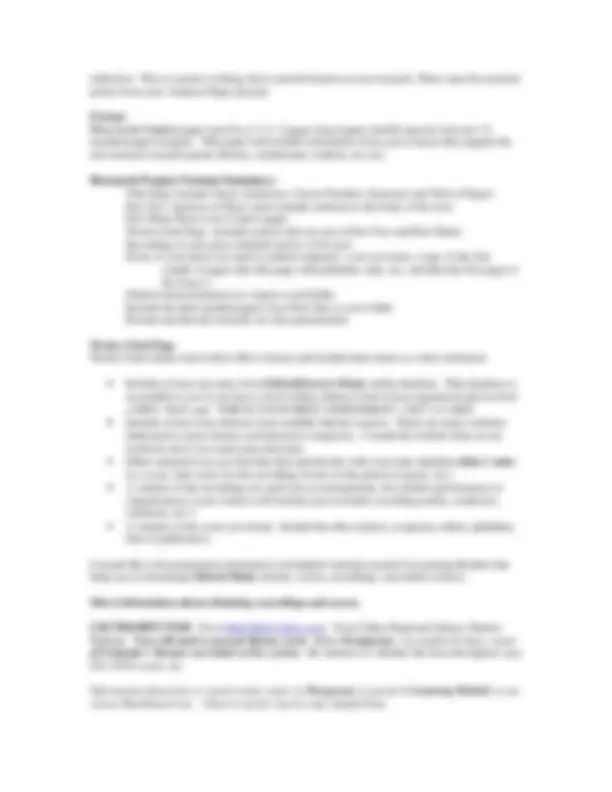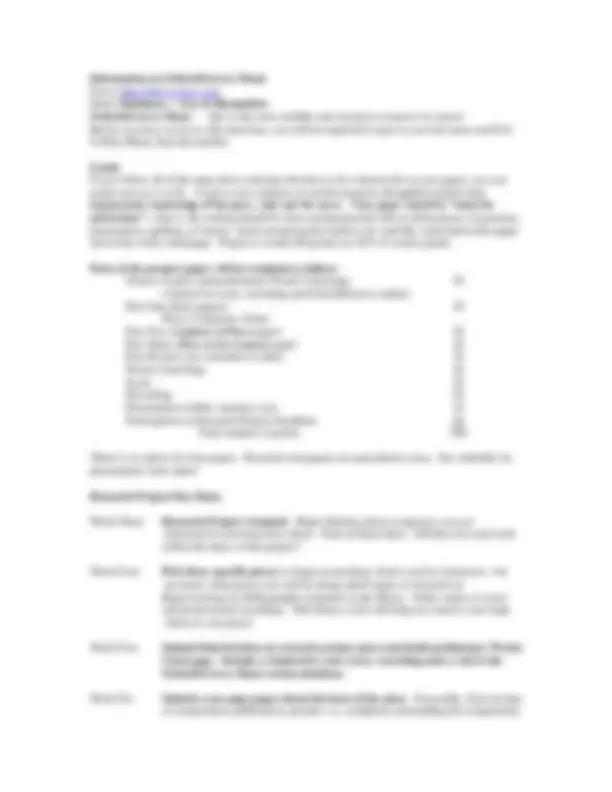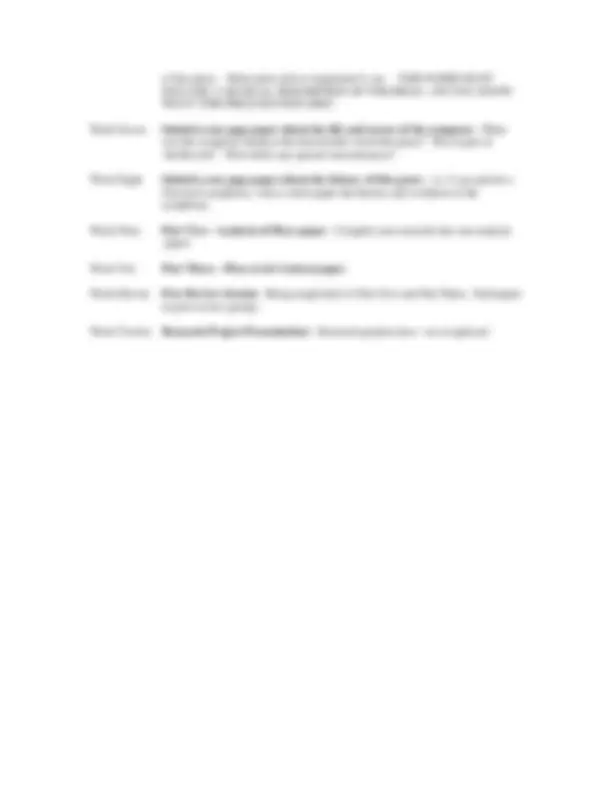





Study with the several resources on Docsity

Earn points by helping other students or get them with a premium plan


Prepare for your exams
Study with the several resources on Docsity

Earn points to download
Earn points by helping other students or get them with a premium plan
Community
Ask the community for help and clear up your study doubts
Discover the best universities in your country according to Docsity users
Free resources
Download our free guides on studying techniques, anxiety management strategies, and thesis advice from Docsity tutors
Material Type: Assignment; Class: Music History I : AH1; Subject: Music; University: Front Range Community College; Term: Unknown 1989;
Typology: Assignments
1 / 5

This page cannot be seen from the preview
Don't miss anything!




Project Description: Locate a score and recording, research, and complete a project that focuses on one piece of music written between the years 1100-1815 from two perspectives: one analytical, the other creative and contextual. There will be several research steps and due dates during the research process. Your final research project will end with a class presentation.
Selection of Piece: You may choose any piece of music written between the years 1100 and1815, with the exception of any piece that is included in your textbook and listening CDs. This research project criteria mandates that you find a scholarly edition of a score and a recording of your piece. Research materials are harder to find for some pieces than for others, so you must some preliminary work before you make your final decision. Begin by choosing three pieces to do preliminary research. Final decision must have approval by instructor.
Find a Recording. This research project also asks you to find a scholarly modern recording of your piece. You will need to either borrow a recording from a library, or perhaps you can find a full version of the piece to download from the internet. Downloading excerpts or “arranged” versions of your piece will not work. Please make every effort to get a recording of the original work…. i.e. not an “arrangement” of the piece for other instruments. Use the interlibrary loan system of Prospector – links to this service are on the Fort Collins Regional Library District website.
Find a Score. Locate a scholarly edition of the score. There are many ways to find a scholarly edition of the score, but the easiest is to go to a music library in your vicinity (i.e. CSU, UNC, CU, etc.) Go to the music area and find the score of the piece you are researching. Make a copy of the first few pages that document the publication information and first page of individual movements. If you wish, you may also use the interlibrary loan system of Prospector.
Approval of Piece. Once your have found and obtained a score and a recording – let me know! Final decision of your research piece must also have approval by instructor (ME). E-mail me when you decide. If you need help finding recording, score or research materials, or even deciding upon a piece, let me know! I can help!
Preliminary Works Cited Page. Consult MLA hand-outs on course Blackboard site and submit a Works Cited page that includes the citation for your score, your recording and a visit to the Oxford/Groves online database.
Investigate the piece. Find out what year it was written, published, and/or premiered. Find out how it was received at the time and find out what other people have written about the piece since then. Write about your findings in a 1 ½ page paper. Include works cited page and citations in the body of paper.
Investigate the life of the composer. What was the composer doing during the year that this composition was composed, published or premiered? Are there special circumstances that surrounded the composition of this work? Write about your findings in a 1 ½ page paper. Include works cited page and citations in the body of this paper.
Investigate the genre and how it may be typical or atypical for the time period. Consult the Harvard Dictionary of Music or Groves Music and find out everything you can about the genre of this piece. For example, if you piece is a Renaissance motet – look up motets and find out the difference between Renaissance motets and Medieval motets. Is your piece representative o of a typical motet in style and technique? How is unique? Write about your findings in a 1 ½ page paper. Include works cited page and citations in the body of the paper.
Write an analysis of the piece. Use the information you have learned from your previous three papers and class lectures and describe principal style features, the structure (form), the relation of text (if applicable), the place this piece lays in the overall output of the composer, and how it represents its genre from its style period. Briefly discuss the composer’s professional status, work, and any conditions surrounding the composition of this work. Also comment on the place of this piece in the history of its genre (is it a typical example of its genre or atypical?).
Remember – this project is about a specific piece…. It is not intended to be a biography of a composer. Bringing in pertinent biographical information on the composer during the year your piece was composed is fine – but don’t spend two pages giving a complete biography. There are already plenty of those out there!
Format Analysis of Piece paper must be at least 3-4 pages long (typed, double-spaced, font size 12, standard paper margins. Cite your sources with MLA documentation both IN THE TEXT and on your WORKS CITED page.
Thoroughly describe one of the first performances of the piece you have chosen – and you must describe it as if you were there! To begin Part Three, imagine that you are a real person at one of the first performances of your piece. You can be either a performer or a listener. You could be a member in Bach’s collegium musicum orchestra, student of Vivaldi, singer in one of Handel’s operas, or whatever you choose! Once you decide who you want to be, learn all you can about the appropriate setting for the musical performance: The surroundings – city, building, church, public concert hall, etc. The type of occasion or service The type of people who might be present Customs or behaviors associated with the occasion Performance practice (what types of instruments? – would it have been performed on “early instruments”?)
Your research should lead you to a variety of library resources (books, scholarly journals and periodicals, etc.) about many subjects (history, architecture, art, fashion, etc.)- NOT JUST MUSIC! When research is done, write a detailed account of your quasi-fictional experience in which you describe: The music (sounds/performance) you hear (this is most important) Your reaction to it The setting (place/occasion/people) in which you hear it The performance forces, vocal or instrumental…..
Identify who you are writing to and why. Part Three could be a letter to a distant friend or employer, or it could be an entry in a personal journal written for your own pleasure and
Information on Oxford/Groves Music Got to http://dalva.fcgov.com Select Databases – Arts & Humanities Oxford/Groves Music - this is the most credible and extensive resource for music! Before you have access to this data base, you will be required to type in your last name and Fort Collins library barcode number.
Grade If you follow all of the steps above and take the time to do a decent job on your paper, you can easily earn an A or B. I want to see evidence of careful research, thoughtful analysis that demonstrates knowledge of the piece, style and the music. Your paper should be “ready for publication” – that is, the writing should be clear and purposeful with no distractions of grammar, punctuation, spelling, or format. Each research point needs to be carefully cited both in the paper and in the works cited page. Project is worth 200 points (or 20% of course grade).
Parts of the project paper will be weighted as follows Choice of piece and preliminary Works Cited page 10 (citation for score, recording and Oxford/Groves online) Part One (three papers) 30 Piece, Composer, Genre Part Two ( Analysis of Piece paper) 30 Part Three ( Piece in its Context paper) 30 Peer Review (see schedule for date) 10 Works Cited Page 30 Score 20 Recording 20 Presentation (folder, neatness, etc) 10 Participation in Research Project Deadlines 10 Total number of points 200
There is no option for late papers. Research and papers are presented in class. See schedule for presentation week dates!
Research Project Due Dates
Week Three Research Project Assigned. Begin thinking about composers you are interested in knowing more about. Find out their dates. Did they live and work within the dates of this project?
Week Four Pick three specific pieces to begin researching. Send e-mail to instructor – let me know what pieces you will be doing initial stages of research on. Begin looking for bibliographic materials in the library. Order copies of score and professional recordings. This library work will help you narrow your topic choice to one piece!
Week Five Submit final decision on research project piece and draft preliminary Works Cited page. Include a citation for your score, recording and a visit to the Oxford/Groves Music on line database.
Week Six Submit a one page paper about the facts of the piece. If possible, find out date of composition, publication, premier. i.e. conditions surrounding the composition
of this piece. Motivation (job or inspiration?), etc. THIS PAPER MUST INCLUDE A MUSICAL DESCRIPTION OF THE PIECE – DO YOU KNOW WHAT THIS PIECE SOUNDS LIKE?
Week Seven Submit a one page paper about the life and career of the composer. What was the composer doing at the time he/she wrote this piece? Was it part of his/her job? Were there any special circumstances?
Week Eight Submit a one page paper about the history of this genre. i.e. if you picked a Classical symphony, write a short paper the history and evolution of the symphony.
Week Nine Part Two – Analysis of Piece paper. Compile your research into one analysis paper.
Week Ten Part Three – Piece in its Context paper.
Week Eleven Peer Review Session : Bring rough draft of Part Two and Part Three. Participate in peer review groups.
Week Twelve Research Project Presentations! Research projects due – no exceptions!